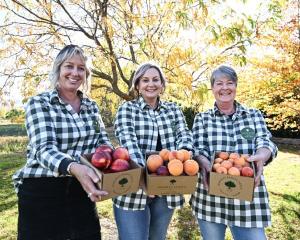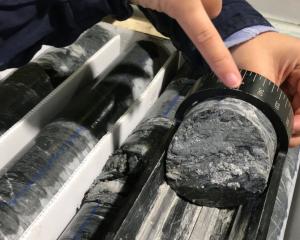This year, almost more than 10,000 tonnes of Otago apples will be traded in more than 60 countries around the world. The apple industry has kept the van der Voort family in business in Central Otago for 50 years. Their Ettrick apple export packhouse is one of New Zealand's largest. Reporter Lynda van Kempen follows some early season Cox's Orange apples, as careful hands and high technology guide the way from picking and packing to trucking out.
Collected from home, a quick bath, a spin through the packhouse and then chilling out on a leisurely sea cruise before meeting the fans overseas - that's the lot of an Otago-grown export apple.
The first of this season's export apples, Cox's Orange, are already on the way to consumers in Europe.
They are among an estimated 600,000 18kg cartons of Otago apples which will end up in more than 60 countries around the world this season.
Ettrick is home to one of New Zealand's largest apple export packhouses - the van der Voort Packhouse.
The family's links to the Central Otago pipfruit industry span more than 50 years.
Con van der Voort planted apples at Ettrick in the 1960s and the Teviot Valley has remained the base for the family's significant investment in pipfruit orchards.
Packhouse general manager Jackie van der Voort said the facility employs 70 people for 11 weeks during the harvest to pack all Otago's conventional (non-organic) export apples.
Although the packhouse contained sophisticated electronic technology, people were still needed for some parts of the process.
''I think regardless of what technology there is eventually, we'll always need people to grade the apples,'' she said.
Last year, the Central Otago it was estimated the apple crop contributed $23 million to the Otago economy.
Although this season's crop is lighter, it is of excellent quality, Jeff McDonald, the Otago regional manager for T&G Pipfruit (formerly known as Enza), says.
''The harvest has just started but the fruit is looking clean and it's a good colour and good quality, so everyone's happy with that.''
While the Asian market prefers its apples sweeter, opting for Pacific Queen and Envy varieties, consumers in the United Kingdom like the tarter varieties, gravitating towards Cox's Orange and Braeburn.
Jazz is popular with all markets.
Ten or 15 years ago, the European market took the majority of Central Otago apples but now the balance has tipped and Asian markets take 60%, followed by the United States, which takes 15%, and the United Kingdom (10%).
The remainder go to the rest of Europe, Germany and France in particular.
China, Thailand, India and the Middle East are all taking growing numbers of New Zealand apples and T&G was constantly looking for new markets and testing out new varieties, Mr McDonald said. Jazz apples are among the new ''superstars''.
''They've certainly been a success story and the markets all want more of them.''
Apples were regarded as a premium imported fruit in Asia, he said.
''Larger sizes are given as gifts or an offering and in Asian cuisine they are often used as dessert with the apple sliced on a plate. Smaller sizes have now become a regular part of the Asian diet, with sales of two to eight apples the norm.''
Apples are a year-round product these days.
Licensed varieties, such as Jazz, are grown overseas on contract and the crop from the northern hemisphere growers can fill the gap when the New Zealand product has finished.
Growers have a choice of two main methods of prolonging the shelf life of apples in storage.
The SmartFresh process controls naturally occurring ethylene during storage and transport, ''holding'' the apples at a certain stage of ripeness by blocking ethylene receptors on the fruit.
The controlled atmosphere process drops the level of oxygen and controls the carbon dioxide levels to slow the ripening process, extending the life of an apple to up to eight or nine months.
Otago apples make up about 8% of the volume exported from this country.












